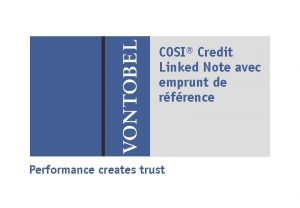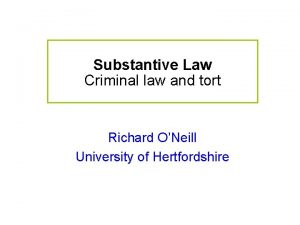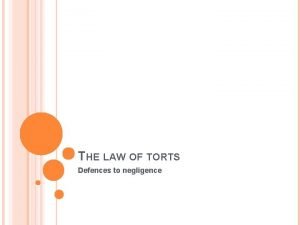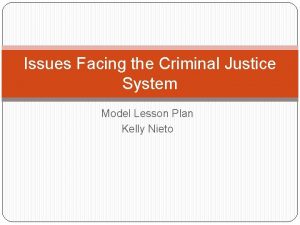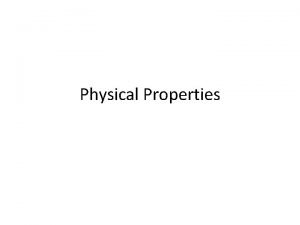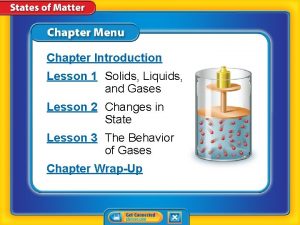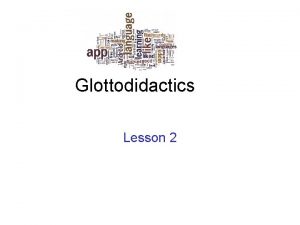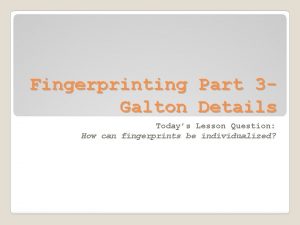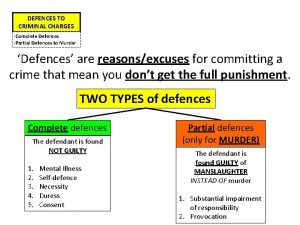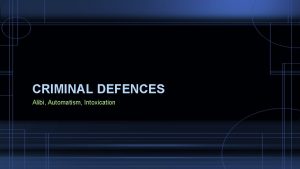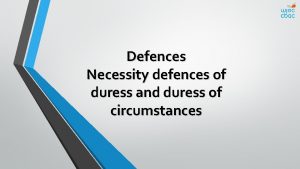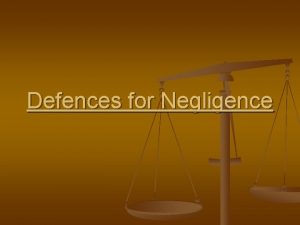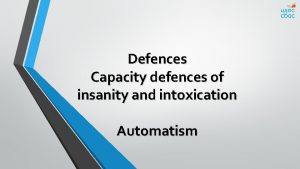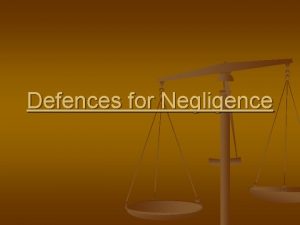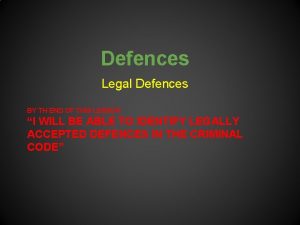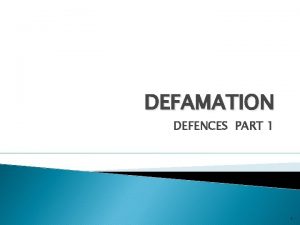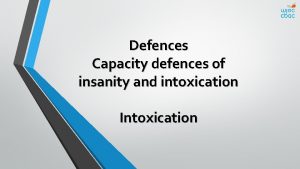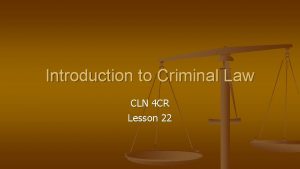Criminal Defences CLN 4 CR Lesson 54 Criminal


























- Slides: 26

Criminal Defences CLN 4 CR Lesson 54

Criminal Defences Learning Goal: Explain how criminal defences provide fairness in the justice system. Minds-On: Under what circumstances might a crime not have taken place? Action: note and discussion Consolidation: R v Ungar (p 279)

Criminal Defences Are there any instances when it is acceptable to commit a crime? What types of defences are available to an accused person charged with a crime? Is ignorance of the law or intoxication a defence to a criminal act?

Defences n n n Innocent until proven guilty Can present a defence after the Crown has put forward its evidence 3 Arguments Deny that they committed the act (disputing the actus reus) Lacked the necessary criminal intent (disputing the mens rea) Have a valid excuse for what happened

Alibi n n n Best possible defence Need to prove where he was Not at the location of the crime Names of witnesses Provide alibi early to help police

Automatism n n n Sleepwalking, convulsions, etc. completely involuntary Burden is on the accused to prove automatism Must demonstrate that actus reus did not exist

n n Developed through common law precedent Must demonstrate that actus reus did not exist

a) Non-insane Automatism n n n ‘temporary insanity’ Result of a blow, stroke, hypoglycemia, sleepwalking, intoxication, etc. R v Parks case Burden of proof rest on the accused Evidence must be significant

b) Insane Automatism Defence n n For people with mental disorders who commit crime In 1992, Criminal Code amended to include, ‘Not Criminally Responsible’ Suffering from a mental disorder at the time of the crime n Disorder made the person incapable of understanding the crime n

n n Page 267 Questions that must be asked at a Fitness hearing to determine if the accused can stand trial

If Found NCR n n If not a threat, discharged back into society If the accused still poses a threat, sent to a psychiatric facility n Case will be reviewed annually

Intoxication n Focuses on intent Not having the requisite mens rea Example: n If unable to form specific intent, due to intoxication, cannot be found guilty of aggravated assault, but rather just a general intent crime like assault

n n Most often used in assault and sexual assault cases R v Daviault (1994) outraged Canadians, leading to a change in the CC n Drunkenness is no longer a defence for general intent offences

Carter Defence n R v Carter (1985) Argued Breathalyzer was wrong n ‘two-beer defence’ n July 2008, CC was changed so you can’t question the Breathalyzer results… unless the machine doesn’t work properly! n

DEFENCES THAT PROVIDE A REASON

Battered Woman Syndrome n n n R v Lavallee, 1990, first recognized prolonged abuse as a ‘reasonable’ defence She shot her husband in the back of the head as he was leaving, in fear that he would return and kill her Danger does not have to be imminent; just perceived to be real

Self-Defence n n May use ‘reasonable’ and ‘necessary force’ to protect yourself and your property Self-defence is justified for what would otherwise be considered an unlawful act

Necessity “In the 1884 British case R v Dudley and Stephens, the defence of necessity was used. Tom Dudley and Edwin Stephens were charged with murder after they killed and ate Richard Parker when they were lost at sea without food.

The men were found guilty, and their defence failed. The judge had to find them guilty to maintain the precedent that this act was murder. However, the judge gave them only six months or so in prison, which was the ‘political’ way to deal with this problem. The were pardoned by the monarch. ” Wikipedia. com

Necessity n n n Due to urgent and immediate circumstances Canadian courts have reluctantly recognized this defence Robert Latimer tried to use this defence but failed Task: R V Ungar, 2002 (page 279)

Duress n n Threat or coercion to force someone to do something against his or her will Ex forced to drive fast, at gunpoint, to let someone escape

Mistake of Fact Ignorance of the facts can be an accepted defence under 2 conditions. 1. If a true mistake occurred that didn’t result from neglecting to find out the truth 2. If the law accepts ignorance of the facts as a defence n n Ex. Passing a counterfeit bill

Entrapment n n n Police action of encouraging or aiding a person to commit an offence It is seen as an abuse of process as opposed to a substantive defence The judge must ‘stay’ the proceedings

Double Jeopardy n Cannot be tried for the same offence twice n One of two pleas is made at a pretrial motion n Autrefois acquit or autrefois convict If the charge is founded on the same facts as before, the judge will dismiss the case Accused will often be tried on a closely related charge

Provocation n n The act of inciting to commit a crime in the heat of passion Ex. Return home to find your child being assaulted so you kill the assailant

Task: n Page 286 question 6. n Find 3 cases with 3 different defences n Google “Canada case defence automatism”, etc.
 Credit linked note
Credit linked note Tort richard
Tort richard Dawlish warren sea defences
Dawlish warren sea defences What are capacity defences
What are capacity defences Bipolar analysis of coastal defences
Bipolar analysis of coastal defences Holderness coastline
Holderness coastline Volenti non fit injuria
Volenti non fit injuria Eighth amendment excessive bail
Eighth amendment excessive bail Criminal investigation lesson plans
Criminal investigation lesson plans Lesson outline lesson 3 describing circuits answers
Lesson outline lesson 3 describing circuits answers Lesson outline lesson 3 mountain building answers
Lesson outline lesson 3 mountain building answers Lesson outline lesson 2 aquatic ecosystems answer key
Lesson outline lesson 2 aquatic ecosystems answer key Micro teaching lesson plan sample
Micro teaching lesson plan sample L 101 lesson 2
L 101 lesson 2 Pati explain to tapi that the beggar
Pati explain to tapi that the beggar Chapter 1 lesson 1 your total health lesson 1 quiz answers
Chapter 1 lesson 1 your total health lesson 1 quiz answers Weather forecast lesson 3 outline answers
Weather forecast lesson 3 outline answers Sat vocabulary lesson 4
Sat vocabulary lesson 4 Lesson 2 physical properties answer key
Lesson 2 physical properties answer key Lesson 1 thermal energy and the behavior of matter
Lesson 1 thermal energy and the behavior of matter Lesson outline lesson 1 climates of earth answers key
Lesson outline lesson 1 climates of earth answers key Lesson outline case study lesson 3
Lesson outline case study lesson 3 Lesson outline lesson 1: understanding science answer key
Lesson outline lesson 1: understanding science answer key Fingerprint galton details
Fingerprint galton details Biome
Biome Lesson 4 gravity and motion lesson review
Lesson 4 gravity and motion lesson review Lesson outline lesson 2 the muscular system answer key
Lesson outline lesson 2 the muscular system answer key
